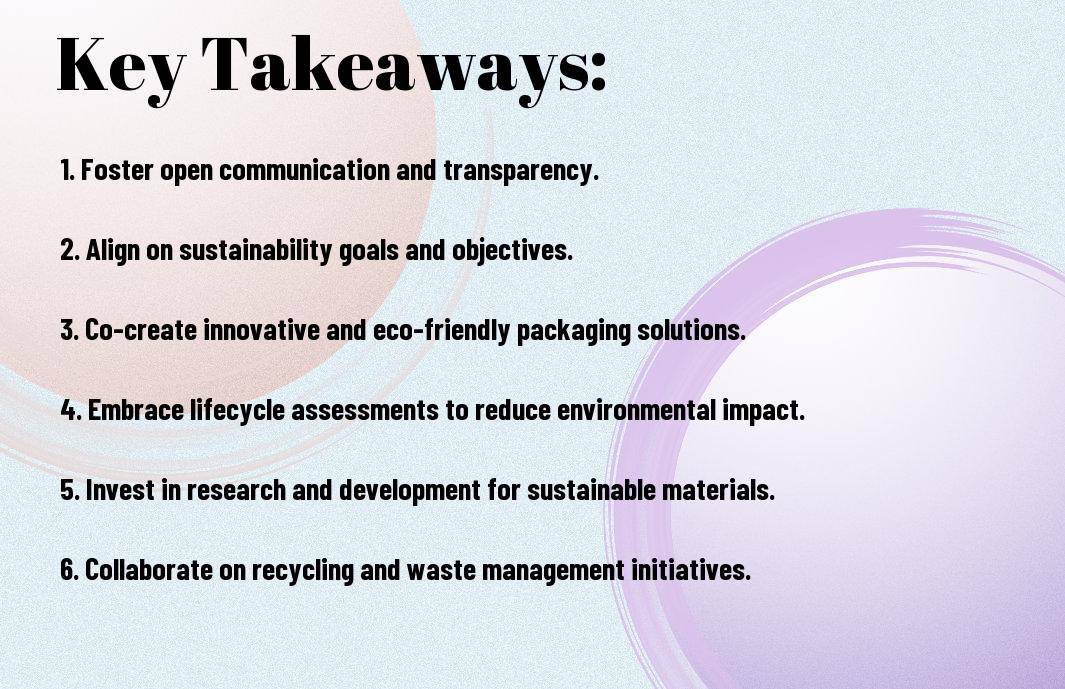Envisioning a more sustainable future for your business is not just a mere ambition, but a necessary step towards preserving the environment for the generations to come. Collaborating with your packaging suppliers is a crucial element in this process. By working closely with your suppliers, you can innovate and develop eco-friendly packaging solutions that not only reduce your environmental impact, but also enhance your brand image.
Key Takeaways:
- Open communication: Businesses should establish open communication with packaging suppliers to discuss their sustainability goals and challenges. This can help suppliers understand the specific needs of the business and work together to develop more sustainable solutions.
- Collaborative innovation: Collaboration with packaging suppliers can lead to the development of innovative and sustainable packaging solutions. By working together, businesses and suppliers can leverage each other’s expertise to create packaging that is eco-friendly, cost-effective, and meets consumer demand.
- Investing in long-term partnerships: Developing sustainable packaging solutions requires a long-term commitment from both businesses and their suppliers. By investing in long-term partnerships, businesses can drive continuous improvement in sustainability and have a more significant impact on the environment.

Existing Problems with Current Packaging Practices
When it comes to packaging, traditional practices have contributed significantly to environmental degradation. The excessive use of plastic and non-biodegradable materials has resulted in a global crisis. According to The Switch to Sustainable Packaging: A Guide for Your Business, the current state of packaging is unsustainable and must be addressed urgently.
Eco-Issues Faced with Traditional Packaging
Traditional packaging methods have led to severe ecological issues, including plastic pollution, deforestation, and excessive carbon emissions. Plastic packaging, in particular, poses a significant threat to marine life and pollutes natural habitats. Moreover, the production of traditional packaging materials contributes to the depletion of natural resources and the release of harmful greenhouse gases into the atmosphere.
Role of Businesses in this Climate Challenge
As a business, you play a crucial role in addressing the climate challenge posed by unsustainable packaging practices. By recognising the environmental impact of your packaging solutions and taking proactive steps to implement sustainable alternatives, you can contribute to a positive change. Your decisions regarding packaging materials, design, and waste management have a direct impact on the environment, and it is essential to embrace this responsibility.
The Potential of Business-Supplier Collaboration
Collaborating with your packaging suppliers can be a game-changer when it comes to developing more sustainable solutions for your business. By working closely with your suppliers, you can tap into their expertise and resources to drive innovation and find ways to reduce the environmental impact of your packaging. This collaboration can lead to cost savings, improved brand reputation, and a more positive impact on the planet.
The Need for a Collaborative Approach
When it comes to addressing sustainability challenges in packaging, a collaborative approach is essential. Your packaging suppliers have valuable insights into the latest sustainable materials and technologies, which can help you make informed decisions about your packaging choices. Additionally, collaborating with your suppliers allows you to align your sustainability goals with theirs, creating a shared sense of purpose and commitment to making a positive impact.
Current Collaborative Success Stories in Sustainable Packaging
There are several success stories that highlight the power of business-supplier collaboration in driving sustainable packaging solutions. Companies that have worked closely with their packaging suppliers have been able to introduce innovative, eco-friendly packaging designs that reduce waste and environmental impact. By leveraging the expertise and capabilities of their suppliers, these businesses have been able to achieve significant reductions in their carbon footprint and waste generation, while also improving the overall appeal of their products to environmentally-conscious consumers.
Implementation strategies for Sustainable Packaging
When it comes to implementing sustainable packaging solutions, there are several key strategies that businesses can employ to collaborate effectively with their packaging suppliers. These strategies can help ensure that the transition to more sustainable packaging practices is smooth and successful.
Establishing the Business-Supplier Relationship
One of the first steps in implementing sustainable packaging solutions is establishing a strong and collaborative relationship with your packaging suppliers. This involves open communication and a clear articulation of your sustainability goals and expectations. By working closely with your suppliers, you can develop a shared understanding of the need for sustainable packaging and create a framework for collaboration.
Strategies for Developing and Enforcing Sustainable Policies
Developing and enforcing sustainable policies within your business is essential to driving the implementation of sustainable packaging solutions. This can include setting clear sustainability targets, such as reducing carbon footprint or increasing the use of recycled materials in packaging. By integrating these policies into your business operations and holding both your internal teams and packaging suppliers accountable, you can drive the adoption of sustainable packaging practices.
Benefits and Challenges of Sustainable Packaging
When it comes to sustainable packaging, there are several benefits and challenges that businesses need to consider. By understanding these, you can make more informed decisions about how to collaborate with packaging suppliers to develop more sustainable solutions.
Economic and Environmental Advantages
Collaborating with packaging suppliers to develop sustainable solutions can offer several economic and environmental advantages for your business. By using materials that are recyclable, biodegradable, or made from renewable resources, you can reduce your environmental impact and appeal to eco-conscious consumers. Additionally, implementing sustainable packaging solutions can lead to cost savings in the long run through reduced waste and lower transportation costs.
Potential Obstacles in the Transition to Sustainable Practices
However, transitioning to sustainable packaging may also present some challenges. You may encounter resistance from traditional suppliers or face higher initial costs when sourcing sustainable materials. Additionally, there may be technical limitations in terms of finding suitable alternatives for specific packaging needs. It’s important to carefully weigh these obstacles against the long-term benefits of sustainable packaging to make informed decisions for your business.
Collaborating with packaging suppliers for sustainable solutions
Hence, it is crucial for businesses to collaborate with packaging suppliers in order to develop more sustainable solutions. By working closely with your packaging suppliers, you can exchange ideas, set clear sustainability goals, and explore innovative materials and designs that reduce environmental impact. This collaboration can lead to the development of eco-friendly packaging solutions that meet consumer demands and environmental standards, ultimately benefiting your business and the planet. For more insights on sustainable packaging, visit The drive toward sustainable packaging.
FAQ
Q: Why is collaborating with packaging suppliers important for businesses to develop more sustainable solutions?
A: Collaborating with packaging suppliers allows businesses to source eco-friendly materials and explore innovative packaging designs that reduce environmental impact.
Q: What are some ways businesses can collaborate with packaging suppliers?
A: Businesses can collaborate with packaging suppliers by engaging in joint research and development, participating in sustainability initiatives, and providing feedback on packaging needs and goals.
Q: How can businesses ensure that their collaboration with packaging suppliers leads to more sustainable solutions?
A: Businesses can ensure sustainable collaboration by setting clear environmental targets, incorporating eco-friendly criteria into supplier selection, and regularly evaluating the environmental performance of packaging materials and designs.
Q: What are the benefits of collaborating with packaging suppliers to develop sustainable solutions?
A: The benefits include reducing carbon footprint, improving brand reputation, meeting consumer demand for eco-friendly products, and potentially reducing costs through efficient use of materials.
Q: How can businesses find the right packaging suppliers to collaborate with on sustainability initiatives?
A: Businesses can identify potential partners by researching supplier sustainability practices, seeking recommendations from industry groups, and conducting audits to assess a supplier’s capability to meet sustainability goals.

